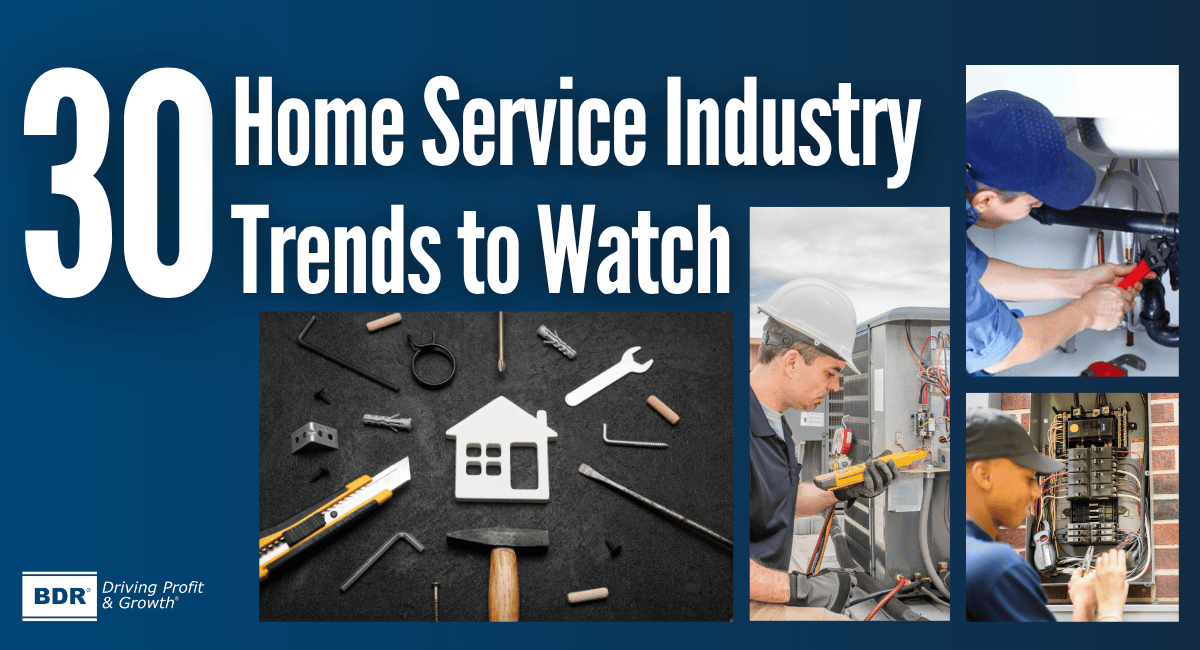30 Home Service Industry Trends to Watch in 2026

The home services industry – particularly HVAC, plumbing, electrical, and general trades – is poised to evolve significantly in 2026.
Driven by AI advancements, shifting consumer behavior, economic volatility, and a growing emphasis on sustainability, the home services sector will continue to see various industry trends shaping operations and customer interactions.
In this article, we will share 30 home service industry trends that are impacting and changing the way people buy from a home service business.
What Is a Home Service Business?
Home service providers help maintain, repair, or enhance a person’s home’s comfort, safety, function, and aesthetics.
Home services businesses have seen significant growth in the past few decades as consumer demand has increased.
The home services market size in the United States is growing yearly, estimated to be between $650 billion and $750 billion annually as of early 2025. According to a recent study, the home service market size could potentially surpass $1 billion annually by 2029.
With the growth of large companies such as Frontdoor Inc. and Amazon Home Services, it is clear that increased demand is catching the attention of larger investment firms and private equity companies.
The increasing demand for home service companies means great opportunities and potential for those wanting to start, run, and grow their own service business.
The Most Common Home Services Business in 2026
In 2026, a home service business is any company that provides specialized services to homeowners, renters, or other residential clients.
These service businesses focus on repairing, maintaining, installing, or improving various aspects of a home and its surrounding property.
Most consumers will outsource one or many home services to a contractor. Whether it is for a specific home improvement or ongoing residential services, home service providers can include:
- HVAC, air conditioning, heating, and indoor air quality
- Plumbing and drainage repairs
- Electrical and wiring
- Gardening and lawn care
- Home cleaning and sanitation
- Home repairs and handyman services
- Roofing installation and repair
- Home appliance repair
- Gutter cleaning
- Pressure Washing
- Flooring installation and repair
- Cabinetary
- Garage Door Services
- Pest Control
- Pool installation, repair, and maintenance services
- Home security and locksmiths
Key characteristics of a home service business often include:
- On-site Service Delivery: Technicians or service providers travel to the customer’s home.
- Skilled Labor: Many home services require specialized knowledge, training, and often licensing (e.g., plumbers, electricians, HVAC technicians).
- Customer-Facing Roles: Direct interaction with homeowners is a significant part of the service.
- Varied Job Sizes: Work can range from minor, quick repairs to large, complex installation projects.
30 Home Services Industry Trends in 2026
As the market trends show, there is clearly a growing demand within the home service market. With this in mind, here is a list of 30 home services industry trends to watch in 2026:
Technology Advancement Trends in Home Services
- AI and Machine Learning: As AI becomes increasingly prevalent in optimizing daily tasks, its impact on home life is also growing. From scheduling appointments and connecting smart appliances to predictive Wi-Fi maintenance and automated customer service, AI is making home services more efficient, reliable, and accessible.
- Field Service Management (FSM) Software: More businesses will adopt advanced FSM software for streamlined operations, including dispatching, invoicing, inventory management, and real-time technician tracking.
- Big Data and Analytics: Along with technological advancement, home service companies are starting to leverage data to understand customer behavior, predict market demand, optimize pricing, and improve service efficiency.
- Internet of Things (IoT) & Connected Homes: HVAC, plumbing, and electrical systems will increasingly connect to smart home ecosystems, allowing for remote monitoring, control, and automated adjustments for energy efficiency and comfort.
- Augmented Reality (AR) for Diagnostics and Training: AR can assist technicians in complex repairs by overlaying digital information onto the physical environment, which will be used for immersive training experiences.
- Online Booking and Quoting Platform Growth: Customers are starting to expect seamless digital convenience—online scheduling, transparent pricing, and instant quotes. Providing upfront cost estimates before an appointment isn’t just a perk; it’s a critical driver of customer satisfaction and trust.
- Cybersecurity Focus: With increased reliance on digital tools and customer data, robust cybersecurity measures will become crucial for trade businesses.
- Robotics and Automation: While still emerging, in the coming decade, we expect to see early adoption of robotics for tasks like pipe inspections, duct cleaning, or carrying heavy materials.
- Cloud-Based Solutions: Continued migration to cloud-based software for accessibility, scalability, and data backup will be prominent. Receipts, reports, and quotes are increasingly sent as paperless emails and PDFs rather than printed forms.
- Enhanced Mobile Apps for Technicians and Customers: Technicians will rely on feature-rich mobile apps for job details and communication, while customers will use apps for service requests, tracking, and payments.
Environmental Sustainability & Energy Efficiency Trends
- High-Efficiency HVAC Systems as Standard: In the HVAC industry, the demand for SEER2 (or future equivalent) compliant and Energy Star-rated HVAC systems will continue to rise, driven by regulations and consumer desire for lower energy bills.
- Electric Heat Pump Technology: A significant shift towards electric heat pumps for heating and cooling, moving away from fossil fuel-based systems, will accelerate.
- Smart Thermostats and Zoning Systems: Advanced thermostats that learn user preferences and integrate with smart home hubs and AC zoning systems for personalized comfort and energy savings will be in high demand.
- Water Conservation Technologies in Plumbing: Low-flow fixtures, intelligent irrigation systems, graywater recycling systems, and leak detection technologies will be key trends in plumbing.
- Eco-Friendly and Low-GWP Refrigerants: Regulatory changes will mandate using refrigerants with lower Global Warming Potential (GWP) in HVAC systems, requiring technician retraining and new equipment.
- Focus on Indoor Air Quality (IAQ) Solutions: Growing awareness of health impacts will drive demand for advanced air purification, ventilation, and humidity control systems.
Customer Experience & Home Service Online Bookings
- Hyper-Personalization of Services: Tailoring services and communication to individual customer needs and preferences based on data analytics will become a competitive differentiator.
- Enhanced Omnichannel Customer Communication: Seamless communication across various channels (phone, email, chat, social media) will be expected by customers.
- Subscription-Based Maintenance Models: More businesses will offer preventative maintenance plans and service subscriptions for recurring revenue and improved customer loyalty.
- Consumer Transparency and Trust: Clear communication about pricing, services, and technician qualifications will become crucial for building customer trust.
- Demand for ‘Touchless’ and Remote Services: Where possible, some customers will continue to prefer remote diagnostics, virtual consultations, and contactless payment options.
- Focus on Soft Skills and Professionalism: Beyond technical expertise, strong communication, problem-solving, and customer service skills will be highly valued in technicians.
- Online Reputation Management: Proactive management of online reviews and customer feedback will be critical for attracting and retaining customers.
Skilled Workforce & Optimized Service Business Operations
- Addressing the Skilled Labor Shortage: Ongoing efforts to attract, train, and retain skilled technicians through apprenticeships, upskilling programs, and improved home service business company culture will be paramount.
- Increased Focus on Technician Training and Certification: Keeping up with new technologies, refrigerants, and smart systems will require continuous training and specialized certifications.
- Data-Driven Recruitment and Retention Strategies: Using analytics to identify ideal candidate profiles and understand factors driving employee turnover.
- Rise of Specialized Niches: Some businesses may focus on highly specialized areas, such as geothermal HVAC, advanced smart home integrations, or specific types of water treatment.
- Supply Chain Management: Continued focus on diversifying suppliers and improving inventory management to mitigate disruptions and control costs.
- State and Federal Regulatory Compliance: Staying abreast of evolving local, state, and federal regulations regarding energy efficiency, refrigerants, licensing, and safety will be essential.
- Flexible Work Arrangements and Employee Wellbeing: While field service remains hands-on, businesses may explore more flexible scheduling or support roles to improve work-life balance and attract talent.
A Bright Future for Home Service Business
These 30 home service industry trends in 2026 indicate a dynamic period for the HVAC, plumbing, electrical, and home services trade industries.
The market demand signals significant business opportunities for entrepreneurs and business owners who are adaptable, customer-focused, and willing to embrace technology.
As a service business coaching and training company, BDR is excited to see our clients’ success and looks forward to helping them continue to grow.
If you need help taking your home service business to the next level, increasing your profit margins, training your team, or standing out from the competition, you can trust our experience.
Want to know how you can take your home service business to the next level?
Reach out to a Profit Coach Advisor today to discover how BDR coaching can help you get there!

